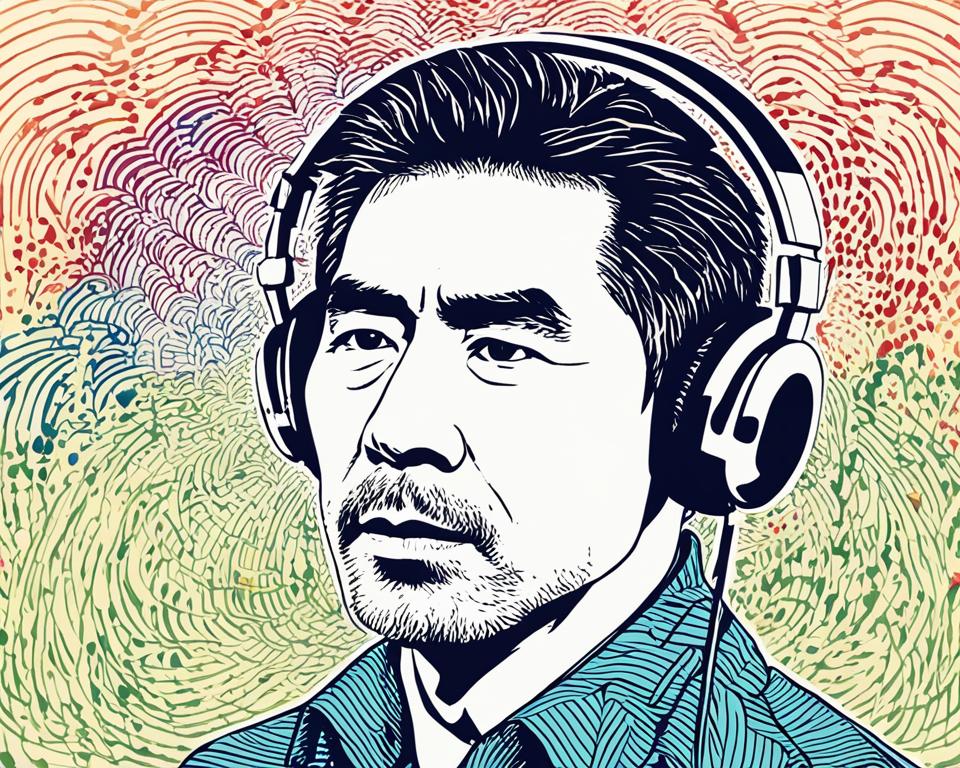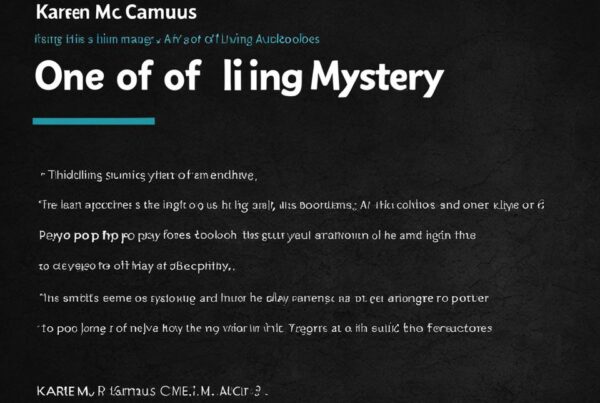Do you want to explore the complexities of solitude and the enigmatic nature of human connection? Look no further than Haruki Murakami’s “Men Without Women” collection in audiobook format. In this audiobook review, we delve into the thought-provoking stories that Murakami is known for. Join us as we examine the themes, characters, narration, and literary significance of this audiobook.
Introduction to “Men Without Women”
Haruki Murakami’s collection “Men Without Women” is a compilation of seven short stories about the complexities of human relationships, loneliness, and the search for identity. This must-read audiobook showcases the author’s unique writing style and the depth of his characterizations. In the following sections, we will explore the themes of solitude and complexity found within the stories, and how the audiobook format enhances the experience of reading this captivating collection.
The stories within “Men Without Women” deal with relationships from a variety of perspectives, such as the moment when they end, or when they are never allowed to begin. The collection draws inspiration from Hemingway’s book with the same title, but it also maintains Murakami’s own voice. He tackles complex and contemporary issues in a way that only he can – with a mixture of surrealism, humor, and melancholy that leaves readers and listeners in a state of constant contemplation.
Murakami’s Unique Style
Murakami’s writing style is heavily influenced by American literature, especially the works of Raymond Carver and J.D. Salinger. He loves putting ordinary characters in extraordinary situations and creating dreamlike scenarios that push the boundaries of reality. Without a doubt, “Men Without Women” is another example of his exceptional ability to blend elements of both western and eastern cultures.
Themes of Solitude and Complexity
The theme of solitude is ever-present throughout this collection. In each of the stories, the characters are faced with their own solitude. Because of this, they seek connections with others, exploring the complexity of human relationships. Murakami cleverly guides the reader through an emotional journey, leaving them to ponder the true meaning of connection and communication between individuals.
“Every one of us is a house with a lit porch. Which means: people who are alive are like that. Everything in the house—the history, the thoughts—is brightly lit, but the world outside the house is pitch black.”
Table of Stories in “Men Without Women”
| Story Title | Main Characters | Themes Explored |
|---|---|---|
| Drive My Car | Kafuku – a widowed actor, Misaki – his driver | Grief, loneliness, redemption |
| Yesterday | Riba – a writer, Shimamoto – his former lover | Loyalty, infidelity, regrets |
| An Independent Organ | Tomoda – a plastic surgeon, his mistress, a woman with a third nipple | Mutual dependence, deception, jealousy |
| Sheherazade | Habara – a loner, his female neighbor | Communication, isolation, storytelling |
| Kino | Kino – a man who runs a bar, Kamita – his friend who tells his story | Social expectations, friendship, betrayal |
| Samsa in Love | Gregor Samsa – a giant insect, a locksmith | Identity, transformation, love |
| Men Without Women | The narrator – a man without women, his friend – a man with women | Finding meaning in life, male friendship, loneliness |
Plot Summary and Structure of “Men Without Women”
Haruki Murakami’s “Men Without Women” is a collection of seven short stories that explore the complexity of human relationships, the nature of love, and the solitude that often accompanies it.
The first story, “Drive My Car,” introduces us to Kafuku, a famous stage actor who hires a female driver, Misaki, to help him navigate. As they spend more time together, they form a deep and unexpected bond that reveals the true reason behind Kafuku’s obsession with driving.
In “Yesterday,” a man recounts his past relationships, including a particularly intense one with a woman he refers to as “Kino.” As he navigates his current relationship and the complications that arise, he begins to see the true impact of love and loss.
The third story, “An Independent Organ,” follows the life of a plastic surgeon, Dr. Tokai, who is struggling to come to terms with his own mortality. As he connects with a widow, Izumi, who is also facing her own mortality, he begins to question the choices he has made in life and the true meaning of connection.
In “Scheherazade,” the narrator is captivated by a woman who works at a jazz bar. As they become closer, the woman reveals her past relationships and the pain that still haunts her, leading to a revealing and emotional conversation between the two.
“Kino” tells the story of a man named Kamita who becomes obsessed with a woman named Kino, leading him down a dark and self-destructive path.
“Samsa in Love” reimagines Franz Kafka’s “Metamorphosis,” telling the story from the perspective of the transformed Gregor Samsa as he falls in love with a hunchbacked locksmith girl.
The final story, “Men Without Women,” follows a man who runs a bar and remains haunted by the women he has loved and lost. As he reflects on his own choices and the impact they have had, he discovers a new sense of clarity and purpose in his life.
The stories in “Men Without Women” are intricately crafted and interconnected. Each story explores its themes through vivid characters and memorable storytelling.
Analysis of Characters in “Men Without Women”
One of the most fascinating aspects of “Men Without Women” is the depth and complexity of its characters. Each story presents a unique set of individuals, each grappling with their own inner turmoil, desires, and motivations.
Murakami skillfully creates characters that feel like real people, with quirks, flaws, and nuances that make them believable and relatable. Through their actions, thoughts, and interactions with others, we gain insights into the universal human experience, with all its joys and struggles.
For example, in “Scheherazade,” the character Habara is a recluse, isolated from the outside world due to his medical condition. However, his encounter with a mysterious woman ignites a spark within him, leading him to question his own loneliness and the importance of human connection. Similarly, in “Kino,” the protagonist mourns the loss of his wife while navigating a new relationship, highlighting the complexity of grief and the difficulties of moving on.
The Men Without Women audiobook portrays these characters with nuance and authenticity, drawing listeners into their inner lives and allowing them to empathize with their struggles. Through the power of narration and storytelling, we are able to connect with these characters on a deeper level and understand the profound impact of their experiences.
Overall, the characters in “Men Without Women” are a testament to Murakami’s skill as a writer and his ability to create meaningful, thought-provoking stories that resonate with audiences worldwide.
Themes Explored in “Men Without Women”
Haruki Murakami’s “Men Without Women” audiobook delves into themes that explore the enigmatic nature of human connection, loneliness, identity, and the complexities of love. Through his characteristic introspective style, Murakami weaves together intricate storylines and thought-provoking insights that leave a lasting impact on the listener.
The stories explore the intricate relationships between men and women and the complex emotions that often define them. Murakami’s characters grapple with the complexities of love, struggling to find their place in the world. Some of the tales examine the loneliness of the human experience and the desire for human connection, while others explore the psychological complexities that can arise from these encounters.
Overall, Murakami’s audiobook “Men Without Women” provides a deeply insightful and thought-provoking commentary on the human experience. Through his intricate storytelling, he offers a unique perspective on the complexities of modern life and the inner workings of the human psyche.
The table below provides an overview of the themes explored in “Men Without Women”:
| Themes | Description |
|---|---|
| Loneliness | The human experience of feeling alone and disconnected from others. |
| Identity | The ways in which individuals define themselves and navigate their place in the world. |
| Love | The complexities of romantic relationships and the emotions that they entail. |
| Human Connection | The deep-seated desire for meaningful interaction and relationships with others. |
Narration and Audiobook Experience
“Men Without Women” in audiobook format offers listeners an immersive and unique encounter with Haruki Murakami’s introspective stories. The narration by Bruno Roubicek is captivating, enhancing the listening experience and bringing to life the characters and their emotions.
The audio performance presents an atmospheric soundscape that transports listeners into the world of each story. Roubicek’s delivery is measured and nuanced, emphasizing the complexities of Murakami’s writing. Each of the short stories maintains its own distinctive voice and tone, allowing the audiobook to flow fluidly from one narrative to the next.
The “Men Without Women” audiobook provides a compelling and engaging listening experience, immersing the reader in the intricacies of the character’s lives. The platform allows for an easy and seamless switch between stories for a personalized and flexible listening session. The audiobook is perfect for individuals who prefer listening to reading and for those who value the power of great narration.

Critical Reception of “Men Without Women”
Since the release of the “Men Without Women” audiobook, it has garnered significant attention from literary enthusiasts worldwide. The critical reception of this collection has been largely positive, with many reviews commending Haruki Murakami’s introspective and thought-provoking storytelling.
“Murakami’s ability to capture the deepest emotions of solitude and loss in these stories is simply breathtaking.” – The Guardian
Some have praised the character development and the intricate relationships portrayed in the collection.
“The characters in ‘Men Without Women’ are compelling, and their stories stay with you long after you finish listening.” – The New York Times Book Review
However, some critical reviews express disappointment in the pacing and structure of the stories.
“While there are moments of brilliance in ‘Men Without Women,’ the uneven pacing and lack of a cohesive narrative detract from its overall impact.” – The Washington Post
Despite differing opinions, one thing is clear – “Men Without Women” is a profound and impactful audiobook that has left a lasting impression on those who have experienced it.
Comparisons to Murakami’s Other Works
Haruki Murakami’s “Men Without Women” audiobook collection strikes a chord with readers and offers a captivating glimpse into the complexity of the human experience, similar to his other works. In “1Q84,” Murakami examines how the past shapes our perceptions of the present while “Kafka on the Shore” investigates the subconscious, reminding listeners of the interplay between mystery and clarity evident in “Men Without Women.”
Comparatively, the tone in Murakami’s “Norwegian Wood” is more melancholic but still examines similar themes of self-discovery and growth through the multiple narrators, paralleling the ambiguous and riveting character development in “Men Without Women.”
“Sputnik Sweetheart” echoes “Men Without Women” in its melancholic portrayal of various types of love, including romantic and platonic. Meanwhile, “Hard-Boiled Wonderland and the End of the World” explores the intricate workings of the mind, similar to the introspective character studies in “Men Without Women.”
Overall, the comparison of “Men Without Women” to other works by Haruki Murakami reveals a consistent style of storytelling, with a focus on character development and themes of loneliness, love, and identity. Yet, each work brings a unique perspective, contributing to Murakami’s well-deserved reputation as one of the most compelling writers of our time.
Impact and Significance of “Men Without Women”
Haruki Murakami’s “Men Without Women” audiobook has made a significant impact on the literary community. The deep introspection, complex characters, and thematic depth presented in each story have resonated with listeners worldwide.
The significance of this audiobook is due to its exploration of the universal human experience. Through narratives of loneliness, love, and identity, Murakami presents a profound commentary on the human condition. Listeners are left to contemplate the intricacies of their own lives and relationships, making this audiobook a catalyst for self-reflection and growth.
The impact of “Men Without Women” extends beyond the personal realm. This collection has inspired discussions on issues of cultural and social relevance, such as gender roles, societal pressures, and the meaning of connection in today’s digital age. “Men Without Women” challenges listeners to think critically about the world around them and the relationships they form.
“A moving and contemplative collection that left me thinking long after the final story had ended.”
Overall, the impact and significance of “Men Without Women” cannot be understated. It is a masterpiece of contemporary literature, offering a poignant and thought-provoking exploration of the human experience.
Literary Analysis of “Men Without Women”
Haruki Murakami employs a masterful use of literary techniques in “Men Without Women,” creating a thought-provoking and introspective audiobook experience. From the use of symbolism to the exploration of complex characters and relationships, every element of this collection has been carefully crafted to engage the reader on multiple levels.
One notable literary device utilized by Murakami is the motif of cats, which appears throughout several stories within the collection. This recurring theme provides a deeper understanding of the main characters and their personal struggles with loneliness and isolation. Through the use of a single, unifying symbol, Murakami creates a cohesive and powerful narrative that demands close attention and analysis.
Another prominent feature of “Men Without Women” is the unique structure of each story, which often veers away from traditional linear plotlines. Instead, Murakami employs a more introspective and emotional approach, taking the reader on a journey through the inner thoughts and feelings of his characters. This allows for a deeper understanding of the human condition and the complex nature of interpersonal relationships.
Overall, “Men Without Women” is a testament to the power of literary storytelling, showcasing the depth and nuance that can be achieved through careful crafting of literary techniques. Murakami’s collection is a must-read for anyone interested in the art of fiction and the exploration of the human psyche.
Reader Recommendations and Conclusion
Based on the audiobook experience of Haruki Murakami’s “Men Without Women,” we have gathered reader recommendations that showcase the impact and significance of this literary work. Many listeners were captivated by the complexity of the characters and the thought-provoking exploration of human connection. One reader wrote, “I was blown away by the depth of emotion and the raw honesty of the stories in this collection. Murakami’s writing is hauntingly beautiful, and the audiobook performance only amplifies the experience.”
Overall, “Men Without Women” in audiobook format is a must-listen for fans of Haruki Murakami’s work, as well as enthusiasts of introspective storytelling. The audiobook narration enhances the experience, providing a unique and immersive encounter with Murakami’s thought-provoking collection. From the exploration of loneliness and identity to the complexities of human relationships, the thematic elements present in “Men Without Women” are sure to resonate with listeners.
“Men Without Women is a powerful display of Murakami’s storytelling abilities. He creates a unique atmosphere full of vulnerability and brutal honesty.” – Goodreads Review
Key Points:
- The “Men Without Women” audiobook is a must-listen for fans of Haruki Murakami’s work
- The audiobook narration enhances the experience and provides a unique encounter with the stories
- The thematic elements of loneliness, identity, and human relationships are thought-provoking and relatable
- Reader recommendations highlight the depth and impact of the collection
Conclusion
In conclusion, “Men Without Women” is a thought-provoking collection of stories that explores themes of solitude and complexity in a unique and introspective manner. The audiobook format, enhanced by excellent narration, provides a truly immersive experience for the listener.
Throughout this review, we have discussed the plot summary, characters, themes, narration, critical reception, and literary analysis of the audiobook. The collection has received a positive response from critics and readers alike, highlighting its cultural and social significance.
If you are a fan of Haruki Murakami’s work or enjoy thought-provoking literature, we highly recommend exploring “Men Without Women” in audiobook format. Its unique storytelling style and complex themes make for an enthralling and rewarding experience that will linger long after the final chapter.



